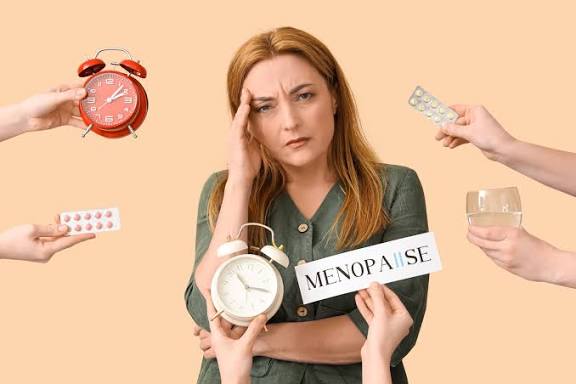
Hormone Replacement Therapy vs. Natural Alternatives for Menopausal Symptoms
Menopause brings hormonal changes that trigger symptoms like hot flashes, mood swings, and bone loss. Hormone Replacement Therapy (HRT) offers fast and effective relief but carries potential risks such as cancer or heart disease. Natural alternatives—herbs, diet, lifestyle, and supplements—provide gentler, safer symptom management, though often less potent.
💪 Fitness Guru
38 min read · 19, Sep 2025

Introduction
Menopause is a natural stage in every woman’s life, yet it often comes with uncomfortable and sometimes disruptive symptoms—hot flashes, night sweats, mood swings, weight gain, and sleep disturbances. For decades, Hormone Replacement Therapy (HRT) has been the standard treatment. But growing awareness of side effects has led many women to explore natural alternatives such as herbal remedies, lifestyle changes, and dietary adjustments.
The big question is: Which is better—HRT or natural approaches? The answer depends on individual needs, health conditions, and preferences. In this article, we’ll compare both methods, explore the science, bust myths, and provide practical tips to help women manage menopause with confidence and balance. Menopause is a natural phase in every woman’s life, typically occurring between the ages of 45 and 55. It marks the end of reproductive years and is brought about by a decline in the production of estrogen and progesterone. While it is a natural biological transition, the symptoms associated with menopause can significantly impact daily life. Hot flashes, night sweats, mood swings, vaginal dryness, sleep disturbances, and bone loss are among the common challenges women face. To manage these symptoms, many turn to treatments, with Hormone Replacement Therapy (HRT) being one of the most widely used medical interventions. At the same time, there is growing interest in natural alternatives that claim to offer relief with fewer risks. The debate over whether HRT or natural remedies are the better option continues to be relevant as women seek safe, effective, and sustainable solutions.
Hormone Replacement Therapy involves the use of synthetic or bioidentical hormones to replace the estrogen and sometimes progesterone that the body no longer produces after menopause. By restoring hormone levels, HRT can alleviate many of the uncomfortable symptoms associated with menopause. Hot flashes and night sweats are often reduced significantly, sleep quality improves, and mood stability returns. Beyond symptom relief, HRT is also known to offer benefits for bone health, reducing the risk of osteoporosis and fractures. In some cases, it may also support heart health, though the research on this remains mixed.
Despite its effectiveness, HRT is not without risks. Studies have linked long-term use of hormone therapy to an increased risk of breast cancer, blood clots, stroke, and cardiovascular disease. The level of risk depends on factors such as age, type of hormones used, dosage, and individual health history. For example, women who begin HRT closer to the onset of menopause often have fewer complications compared to those who start later. Doctors typically recommend using the lowest effective dose for the shortest possible time. Still, the potential side effects make many women hesitant about starting or continuing HRT.
As a result, natural alternatives have gained popularity. These options include lifestyle changes, dietary adjustments, herbal remedies, and non-hormonal supplements. One of the simplest yet most effective natural strategies is lifestyle modification. Regular physical activity helps reduce hot flashes, supports weight management, improves sleep, and strengthens bones. A balanced diet rich in fruits, vegetables, whole grains, lean proteins, and calcium can also contribute to overall well-being during menopause. Limiting caffeine, alcohol, and spicy foods often helps reduce hot flashes and night sweats. Stress management techniques such as yoga, meditation, and deep breathing exercises further aid in emotional balance and sleep improvement.
Herbal remedies are another area of interest. Black cohosh, red clover, and evening primrose oil are commonly used herbs believed to help with hot flashes and other menopausal symptoms. Phytoestrogens, which are plant-derived compounds with estrogen-like effects, are found in foods like soy, flaxseed, and chickpeas. These natural compounds may provide mild relief from symptoms by mimicking the effects of estrogen in the body, although their effectiveness varies among individuals. Some women find significant comfort, while others notice little change.
Nutritional supplements such as vitamin D, calcium, and omega-3 fatty acids can also play a role in managing menopausal health. These nutrients help maintain bone strength, support cardiovascular health, and improve mood. Additionally, acupuncture and other traditional practices have shown promise for symptom management, especially in reducing hot flashes and improving sleep quality.
The question remains whether natural alternatives can truly match the effectiveness of HRT. In most cases, natural remedies provide milder relief compared to hormone therapy. For women with severe symptoms that disrupt daily life, HRT often delivers faster and more noticeable results. However, natural methods have the advantage of fewer serious risks. They promote overall health and can be sustained long term without the concerns of increasing cancer or cardiovascular risk.
The decision between HRT and natural alternatives is highly personal and depends on individual health needs, risk factors, and lifestyle preferences. Some women may choose to combine approaches, using HRT for a limited time to manage severe symptoms and then transitioning to natural strategies for long-term maintenance. Others may avoid HRT altogether due to health risks or personal beliefs and instead focus on natural approaches from the start.
It is also worth noting that the field of hormone therapy has evolved. Bioidentical hormones, which are chemically identical to the hormones produced in the human body, are increasingly used and may carry fewer risks than traditional synthetic options. However, more research is needed to fully understand their safety and effectiveness.
Healthcare providers play an essential role in helping women navigate these choices. A thorough assessment of medical history, family history, and current health status is critical before starting HRT or adopting natural alternatives. Open communication between patient and doctor ensures that women understand both the benefits and risks of their options.
In the end, menopause is not a one-size-fits-all experience. Some women may breeze through the transition with minimal discomfort, while others struggle with life-altering symptoms. For the latter group, relief is essential to maintaining quality of life. HRT remains one of the most effective tools for managing moderate to severe symptoms, but it requires careful consideration due to potential health risks. Natural alternatives, while gentler, can still offer meaningful relief, especially when combined with healthy lifestyle practices.
The key is to respect the uniqueness of each woman’s experience and provide tailored support that aligns with her health profile and personal values. Whether through HRT, natural methods, or a combination of both, the goal remains the same: to empower women to embrace menopause with comfort, confidence, and long-term health in mind.
Understanding Menopause and Its Symptoms
Menopause marks the end of a woman’s reproductive years, usually occurring between ages 45 and 55. It’s diagnosed after 12 consecutive months without menstruation. The transition (perimenopause) can begin years earlier, with fluctuating hormones causing many symptoms.
Common symptoms include:
- Hot flashes and night sweats
- Irregular periods
- Vaginal dryness
- Sleep problems
- Mood swings, anxiety, or irritability
- Memory issues or “brain fog”
- Weight gain, especially around the abdomen
- Loss of bone density and muscle mass
The root cause is the decline in estrogen and progesterone levels, which affect almost every system in the body.
Hormone Replacement Therapy (HRT)
What it is:
HRT involves taking synthetic or bioidentical estrogen and sometimes progesterone to replace declining hormone levels. It can be taken as pills, patches, gels, creams, or injections.
Benefits of HRT:
- Relieves Hot Flashes and Night Sweats – Considered the most effective treatment.
- Improves Sleep Quality – By reducing night sweats and balancing hormones.
- Protects Bone Health – Helps prevent osteoporosis and fractures.
- Enhances Vaginal Health – Reduces dryness, irritation, and painful intercourse.
- Boosts Mood and Energy – Stabilizes hormone-related emotional fluctuations.
Risks of HRT:
- Increased risk of blood clots and stroke (especially with oral pills).
- Higher risk of breast cancer with long-term use.
- Possible gallbladder issues.
- Not suitable for women with certain medical histories (like heart disease, liver problems, or hormone-sensitive cancers).
Who benefits most from HRT:
Women with severe menopausal symptoms, early menopause, or those at high risk of osteoporosis often see significant improvements with HRT under medical supervision.
Natural Alternatives for Menopausal Symptoms
For women who prefer to avoid hormones or cannot take HRT for medical reasons, natural remedies and lifestyle changes can make a huge difference.
1. Herbal Remedies
- Black Cohosh: Reduces hot flashes and night sweats.
- Red Clover: Contains phytoestrogens that mimic estrogen mildly.
- Ashwagandha: Supports stress relief, sleep, and mood.
- Dong Quai: Traditional Chinese herb for hormonal balance.
2. Phytoestrogen-Rich Foods
- Soy products (tofu, soy milk, edamame)
- Flaxseeds and sesame seeds
- Chickpeas and lentils
These foods mimic estrogen’s effects naturally and can reduce hot flashes.
3. Vitamins & Minerals
- Vitamin D & Calcium: Strengthen bones.
- Magnesium: Improves sleep and reduces anxiety.
- Vitamin B Complex: Supports energy and mood stability.
4. Lifestyle Practices
- Exercise: Weight training and yoga improve bone density, reduce stress, and regulate weight.
- Mindfulness & Meditation: Helps with mood swings and sleep.
- Balanced Diet: Focus on whole grains, leafy greens, lean protein, and hydration.
5. Alternative Therapies
- Acupuncture: Found effective for hot flashes in many women.
- Aromatherapy: Lavender, clary sage, and peppermint oils can calm nerves and reduce heat sensations.
- Massage & Relaxation: Supports circulation, reduces stress, and improves sleep quality.
HRT vs. Natural Alternatives: Key Differences
Effectiveness:
- HRT works faster and stronger for severe symptoms.
- Natural methods may take time but provide gentle, holistic relief.
Safety:
- HRT carries risks if used long-term or without medical supervision.
- Natural remedies are generally safe but must be chosen carefully (some herbs may interact with medications).
Approach:
- HRT replaces missing hormones directly.
- Natural methods encourage the body’s own balance through lifestyle, diet, and plant compounds.
Daily Practices to Ease Menopause Naturally
Morning Routine
- 10 minutes of deep breathing or yoga
- Herbal tea (soy milk latte, or flaxseed smoothie)
- Light breakfast with whole grains and fruit
Midday Boost
- Take a short walk or stretch to ease stress
- Include protein-rich lunch with leafy greens
- Practice mindful eating to avoid weight gain
Evening Ritual
- Avoid caffeine and alcohol after sunset
- Herbal tea (chamomile, peppermint) before bed
- Gentle stretching or meditation to relax
Weekly Habits for Menopause Wellness
- Do 3 strength-training sessions to preserve bone and muscle.
- Enjoy 2–3 yoga or mindfulness sessions to reduce stress.
- Add phytoestrogen foods like soy or flaxseeds to meals at least 3–4 times.
- Try one herbal supplement or tea blend consistently.
- Dedicate one evening to self-care rituals—warm bath, journaling, or aromatherapy.
Common Symptoms and Prevention Tips
Hot Flashes
- Wear cotton clothes
- Keep a fan or water spray nearby
- Avoid spicy foods and excess caffeine
Sleep Disturbances
- Maintain a regular sleep schedule
- Keep the bedroom cool and dark
- Herbal teas like chamomile or valerian help
Mood Swings
- Practice breathing exercises
- Journaling or gratitude writing
- Include omega-3s from flaxseed or fish
Bone Loss
- Do weight-bearing exercises
- Ensure calcium and vitamin D intake
- Limit alcohol and smoking
Myths About Menopause Management: Busted!
“Only HRT can treat menopause symptoms.”
→ False! Natural alternatives and lifestyle changes can be very effective for mild to moderate symptoms.
“Herbal remedies are always safe.”
→ Not true. Herbs can interact with medicines—consult a professional before use.
“Soy causes breast cancer.”
→ Misleading. Moderate soy intake from natural foods may actually protect against breast cancer.
“Menopause means life goes downhill.”
→ Completely false. With the right care, menopause can be a phase of renewal, strength, and empowerment.
Sample Menopause Wellness Plan
Breakfast
Oatmeal with flaxseeds, berries, and almond milk
Green tea or soy latte
Morning Activity
20 minutes yoga or brisk walk
Lunch
Grilled tofu or chickpea salad with leafy greens
Lemon water for hydration
Evening Snack
Handful of walnuts or pumpkin seeds
Herbal tea with lavender
Dinner
Brown rice with vegetables + fish or paneer
Warm golden milk with turmeric before bed
Weekly Add-ons
- One acupuncture or massage session
- Strength training workout
- Relaxation night with journaling and music
Conclusion
Menopause is not a disease—it’s a natural transition. Both HRT and natural alternatives have their place in managing symptoms. HRT can be life-changing for women with severe discomfort, while natural remedies and lifestyle changes provide safer, holistic long-term support.
The best approach often lies in personalization—sometimes combining both under medical guidance. What matters most is listening to your body, respecting your needs, and choosing a path that makes you feel strong, balanced, and vibrant.
Remember, menopause isn’t the end—it’s the beginning of a new, empowered chapter. With awareness and the right choices, you can embrace it with grace and energy.
Q&A Section
Q1:- What is Hormone Replacement Therapy (HRT)?
Ans :- HRT involves taking synthetic or bioidentical hormones (estrogen, progesterone, sometimes testosterone) to replace those lost during menopause, helping reduce hot flashes, night sweats, and bone loss.
Q2:- What are the common natural alternatives for managing menopausal symptoms?
Ans :- Natural options include phytoestrogens (soy, flaxseed), herbal remedies like black cohosh, lifestyle changes (diet, yoga, exercise), and supplements such as vitamin D, calcium, and omega-3s.
Q3:- How effective is HRT compared to natural remedies?
Ans :- HRT is clinically proven to be highly effective for severe symptoms, while natural alternatives often provide milder relief, best suited for women with moderate or less disruptive symptoms.
Q4:- What are the risks of Hormone Replacement Therapy?
Ans :- HRT may increase risks of blood clots, stroke, breast cancer, and gallbladder disease, especially with long-term use or higher doses.
Q5:- Are natural remedies completely safe for all women?
Ans :- No, some herbs and supplements may interact with medications or cause side effects. For example, black cohosh may affect liver health, so medical guidance is important.
Q6:- How do lifestyle changes support menopause naturally?
Ans :- Balanced diets, regular exercise, stress reduction techniques like meditation, and adequate sleep help stabilize mood, improve bone health, and reduce hot flashes.
Q7:- Can HRT improve bone and heart health during menopause?
Ans :- Yes, HRT helps maintain bone density and may support heart health if started around early menopause, but risks must be carefully weighed.
Q8:- Which women are not suitable candidates for HRT?
Ans :- Women with a history of breast cancer, blood clots, liver disease, or uncontrolled hypertension are usually advised to avoid HRT.
Q9:- How long should women continue HRT if they choose it?
Ans :- Doctors typically recommend the lowest effective dose for the shortest possible duration, often reassessing treatment every 6–12 months.
Q10:- Can a combination of natural remedies and medical treatments be used?
Ans :- Yes, many women combine gentle natural methods with medical supervision, using HRT for severe symptoms while adopting diet, exercise, and supplements for long-term support.
Similar Articles
Find more relatable content in similar Articles

Prison-Style Fitness: Discipline and Routines Behind Bars...
Prison-style fitness emphasize.. Read More

Fitness as Therapy for Anger, Stress, and Sadness...
Fitness is not just about buil.. Read More

Body Care Habits You Should Never Skip — For Both Him and H..
Body care isn’t just about lo.. Read More

Ice Workouts: Training in Extreme Cold for Fat-Burning...
“Discover the chilling science.. Read More
© 2024 Copyrights by rFitness. All Rights Reserved.